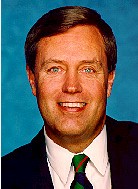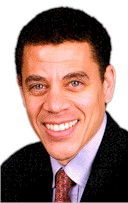
Oxley (R-OH)
Oxley Will Introduce Bill to Reverse FCC Decision Restricting
Religious Broadcasting
(January 14, 2000) Rep. Mike Oxley and other Representatives say they will introduce a bill when the Congress reconvenes that will reverse the FCC's recent decision restricting religious broadcasters who hold noncommercial TV licenses.
| Related Documents |
| Religious Broadcasting Freedom Act (Oxley bill). |
| ¶¶ 43-56 of the FCC Order (section pertaining to religious broadcasters). |
| Dissent of Commissioners Furchtgott-Roth and Powell. |
| Complete FCC Order (large MS Word document in FCC web site) |
The Federal Communications Commission (FCC) issued a decision on December 15, 1999 on the application to assign a reserved noncommercial educational (RNE) broadcast television license. WQED, one of two PBS stations in Pittsburgh, sought to assign its license to Cornerstone, a religious broadcaster.
The FCC approved the transfer. However, the FCC added to its lengthy decision a section which it termed as additional guidance for religious broadcasters.
The license at issue in this matter was an RNE license, rather than a commercial license. By regulation (47 C.F.R. § 73.621) a station operating on a reserved channel must be "used primarily to serve the educational needs of the community." However, the rule does not define the term "educational".
The FEC's decision construed this "educational" requirement in a way that would exclude much religious programming.
|
"programming primarily devoted to religious exhortation, proselytizing, or statements of personally-held religious views and beliefs generally would not qualify as “general educational” programming." Federal Communications Commission |
|
|
"We assure you that this policy will not stand. . . . The policy you have instituted amounts to an unconstitutional restriction on religious speech." Reps. Oxley, Largent, Pickering, and Stearns. |
Specifically, the FCC wrote: "Conversely, however, not all programming, including programming about religious matters, qualifies as “general educational” programming. For example, programming primarily devoted to religious exhortation, proselytizing, or statements of personally-held religious views and beliefs generally would not qualify as “general educational” programming. We reiterate that the reserved television channels are intended “to serve the educational and cultural broadcast needs of the entire community to which they are assigned,” and to be “responsive to the overall public as opposed to the sway of particular political, economic, social or religious interests."" [See, FCC decision, at ¶ 43, footnotes omitted.]
Moreover, while the underlying principle is contained in a rule which was promulgated pursuant to the requirements of rule making procedings, including the receipt of public input, the December 15 order, in effect, modifies the rule, without a rule making proceeding. Finally, while the decision was made on December 15, the FCC did not release it until December 29. Thus, the decision was released both during a Congressional recess, and over a major holiday.
The FCC's decision was also the subject of internal controversy. Two of the five Commissioners, Harold Furchtgott-Roth and Michael Powell, wrote a separate statement in which they strongly criticized the "additional guidance."
"This guidance is, in fact, a significant departure from well-established Commission practice," wrote the two dissenting Commissioners. "This guidance may open a Pandora’s Box of problems that will create confusion and litigation that noncommercial licensees can ill afford." They added that it is "unwarranted and may well be unconstitutional".
 |
|
| Rep. Mike Oxley (R-OH) |
The decision then quickly encountered criticism from Republicans in the House of Representatives. Rep. Mike Oxley (R-OH) and several others wrote a highly critical letter to FCC Chairman William Kennard on January 6. In it they wrote: "We understand that the FCC, in its infinite wisdom, has decided to begin passing judgment on which religious programming is and isn't "educational" for purposes of acquiring and holding a noncommercial educational television license."
They called the restriction "utterly unacceptable", "outrageous", and "unconstitutional".
They also wrote a letter on January 6 to Vice President Al Gore, who is a supporter of Chairman Kennard. "Washington bureaucrats have no business regulating the speech of religious broadcasters," they wrote. "We urge you to condemn the FCC's actions and counsel the Commission to withdraw its order."
| More Documents |
| Letter from Congressmen to Kennard, 1/6/00. |
| Letter from Congressmen to Al Gore, 1/6/00. |
| Press Release of Rep. Oxley, 1/11/00. |
| Letter from Kennard to Congressmen, 1/12/00. |
| Letter from Congressmen to Kennard, 1/12/00. |
The Congressmen have also prepared a discussion draft of a bill, which they are circulating with other Members of Congress. They are seeking further support, and more cosponsors.
Rep. Mike Oxley (R-OH) is a senior member of the House Commerce Committee and its Telecom Subcommittee, which oversee the Federal Communications Commission. The cosponsors of the forthcoming bill include Rep. Tim Stearns (R-FL), Rep. Steve Largent (R-OK), Rep. Roy Blunt (R-MO), and Rep. Chip Pickering (R-MS). All are members of the Commerce Committee.
In addition, House Majority Leader Dick Armey (R-TX) will also cosponsor the measure.
 |
|
| William Kennard |
On January 12, an unrepentant Chairman Kennard wrote back. He made several points. He stated that the "FCC granted the Cornerstone application". He also pointed out that not all religious broadcasters are affected by the decision, because the "majority of broadcasters offering religious-oriented programming are exempt from the NCE eligibility requirements described in the Cornerstone decision because they use commercial channels".
The Religious Broadcasting Freedom Act, which Rep. Oxley can introduce when the Congress reconvenes later this month, would undo the FCC's decision as it pertains to regulating the content of religious broadcasters. The bill would permit the FCC to set rules for religious broadcasters, but only by means of agency rulemaking process.
The bill provides that the "additional guidance contained in the Commission's memorandum opinion and order in WQED Pittsburg (FCC 99-393), adopted December 15, 1999, and released December 29, 1999, shall not be effective after the date of enactment of this Act ..."